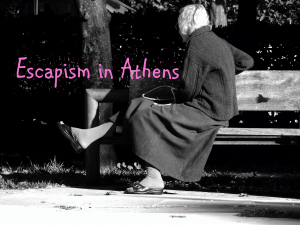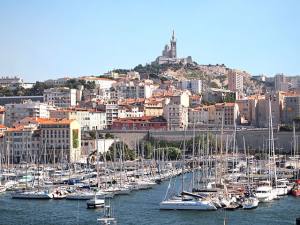ABOUT US
XpatAthens
Escapism Ιn Athens - FokiaNou Art Space
Life is inherently stressful, especially when you live in the big city. We often experience unpleasant, boring, even miserable moments that we would rather avoid. We seek escape from them through activities that take the mind and body away from problems and everyday life. Methods of escape vary with each individual, including travel, reading, music, music, sports, dancing, gardening, as well as drugs and alcohol, aimless walking through the city, casual sex, perhaps even the pleasure of doing absolutely nothing. Exploring what leads us to relaxation, joy and daydreaming, the small doses of happiness in the city, FokiaNou Art Space, continuing its January group exhibitions with Athens as its subject, held an open call asking artists to showcase the most characteristic Athenian expressions of escapism, in any medium.
Opening: Thursday, 19 January 18.00
Duration: 19 January – 4 February 2023
Hours: Thursday – Saturday 17.00-20.00
FokiaNou Art Space, Fokianou 24, 7th Floor, Pagrati
Μetro: Evangelismos
The Greek Origins Of Marseille
The Greeks are well known for their ancient tales of glory and tragedy, as well as their civilization’s innumerable contributions to the very foundations of our modern world.
However, what is lesser-known is that throughout the centuries, they founded scores of cities across the Mediterranean which not only exist today but thrive and play a crucial role in their region’s affairs.
One of these cities is the huge port city of Marseille, the second-largest city in France and definitely among the oldest in Europe.
This was at a time when many Phocaeans left their homeland in today’s Turkey (then Greek-speaking Asia Minor) and reached the northern shores of the Western Mediter-ranean.
They found a locale which could easily accommodate a large port and in a few years’ time, a new Greek colony had been established. Its name was ”ΜΑΣΣΑΛΙΑ” (”Massalia”).
The Greek myth of Marseille
The Greek philosopher, Aristotle, informs us about the myth concerning the foundation of Massalia.
According to this tale, Protis, the son of Euxenous from Phocaea, married Gyptis, the daughter of a King of a Celt tribe named Segobriges or Segusiavi, who lived in Gaul, ancient France. This marriage was the beginning of the story of Marseille.
When the Greek man married this rich and beautiful Celtic woman, the local King gave him the right to obtain a piece of land and build his town. This small settlement was the foundation of what was to become the well-known city of Massalia.
The greater Mediterranean region, ca. 800-550 BC
However, this well-known legend may have been disproven since, according to archaeological evidence, the Phocaeans were not the first Greeks to arrive on the northern shores of the western Mediterranean Sea.
The entire coastal region comprised of the modern regions of Catalonia, Spain, and France had seen the arrival of many Ionian Greeks before that time during their expeditions to the West to find new places to live and people with whom to trade.
Nonetheless, the city of Massalia itself was indeed established by Phocaeans, as they were the first to permanently settle there.
Other neighboring Greek colonies
The “Massaliotes,” as the Greeks of Marseille were known, first established good relations with other neighboring Greek colonies in the region beginning in the early stages of their colonization.
These colonies included the cities of Agde (Agathe Tyche, meaning ”Good Fortune”) in France; Antibes; Emporiae (the modern city of Empuries in Catalonia); Rhoda (the modern Roses in Catalonia); and, of course, the well-known cities of Nice (Nikaia) and Monaco, the modern-day cosmopolitan principality.
Originally published on: greekreporter.com
Dentist-Pass For Children To Be Launched
Goal of the Health Ministry is that starting from March 2023 parents will be able to book an appointment with a dentist of their choice simply using the new Dentist Pass voucher.
Dentists who wish to participate in this new service network will be able to participate, provided they have a registered POS.
The program Dentist-Pass includes a visit to the dentist and thus for the following services:
- Control of the child’s oral hygiene
- Dental fluoridation
- Cleaning Oral hygiene information and instructions for children and parents
One of the two parents submits an application for the issuance of the financing card through gov.gr or through the KEPs on the Program’s Electronic Platform.
The card will then be stored in the digital wallet of the beneficiary parent’s mobile phone and can be used at the POS of all dental offices.
Each voucher that will be activated will be valid for six months.
The Dentist Pass voucher is reportedly set to cover 600,000 children aged 6 to 12.
Originally published on: keeptalkinggreece.com
Meteora Among World’s Must-visit Destinations for 2023 According To Le Monde
Founded in 1944, the daily afternoon newspaper is considered France’s most trusted national newspaper, according to a 2021 Reuters Institute poll, operating a website among the country’s 50 most visited and can be easily obtainable in many non-French-speaking countries.
Le Monde’s annual Top 20 list for 2023 includes Meteora in the sixth place, referring to it as “the suspended islands” due to its unique geological landscape shaped millions of years ago, when the sea covering the area gave way to dry land creating the famed UNESCO Word Heritage site.
The newspaper’s journalist Bénédicte Bocays mentions Meteora as a family of “limestone giants” that are home “to monasteries built between the 14th and 16th century”. Bocays visited the area last year during a fam trip organized by the Greek National Tourism Organization’ (GNTO) branch in France.
Furthermore, Yoanna Sultan-R’bibo, Le Monde’s editor responsible for its travel, design and gastronomy sections, says that Meteora is the “second most popular site in Greece after the Acropolis in Athens“. She adds that the area is ideal for walking tours starting from the nearby town of Kalambaka and continuing up to the “incredible” seven-century-old cave monasteries.
The newspaper’s travel feature on Meteora also offers a detailed description of the area, emphasizing on its historical and cultural heritage. Useful information for those interested in organizing a trip to the region is also included.
Originally published on: news.gtp.gr
Ancient Olympia’s Helmet Mystery Impresses Scientists
Archaeologist Ticia Verver piqued the interest of fellow archaeologists when she took a photo, which showed rows of well-preserved helmets dating back to antiquity.
According to Verver, warriors who returned victorious from the battlefields showed their gratitude to Zeus by offering him their weapons. Olympia, due to the existence of the temple of Olympian Zeus, proved to be an important place for collecting weapons. The result is that a large number of helmets, shields, and spears can be found there.
The archaeologist also pointed out why visiting Olympia is so important. Individuals, as well as city-states, made offerings to Zeus, both money and statues (among them the famous Nike of Paionios from 421 BC), bronze tripods, shields, helmets, and weapons. Olympia is still a living Museum of Greek art and culture.
Originally published in Greek, on: iskra.gr
New York Times Recommend A Greek Destination For 2023
At the top of its list of proposed destinations for 2023 is London, with the NYT noting that the bustling city is preparing for the coronation of King Charles.
The American newspaper in its list chooses destinations that are ideal for their cuisine, culture, for adventure or thanks to their natural beauty.
Regarding our country for the New York Times, Methana is one of the places one should visit in 2023, which ranks 39th on the list.
"Athens’s nearest active volcano, Methana, sits on a peninsula of the same name some 30 miles southwest of the Greek capital. Though largely unknown to tourists, the area is slowly evolving, in part because of its increasing popularity as a hiking destination.
"In recent years, groups of locals have managed to reopen and map old walking paths, some of which date back to the Mycenaean Era, creating hiking trails that attract visitors from around the world. (So far, more than 18 miles have been cleared and marked.)
"The Methana Volcano Challenge, first organized in 2021, offers a trail run across the peninsula’s sloping landscape.
"Visitors to this volcanic peninsula can also enjoy several hot springs, the most interesting of which is an ancient (and recently renovated) tub known as the Pausanias Baths near the village of Agios Nikolaos."
Services Of Athens Municipality Become Fully Digitized
The digitization of the total of the municipality’s agencies until the end of 2022 was mayor of Athens Kostas Bakoyannis’ personal commitment, according to an announcement on Monday.
A total of 207 services are available to all Athenians after the addition of the last 56 services to the municipality’s platform.
The platform is in Greek.
Greek Music & Festivals Recognized As UNESCO's Intangible Cultural Heritage
UNESCO, the United Nations Educational, Scientific and Cultural Organization, has been pivotal in changing and expanding the term ‘cultural heritage’: in it’s 2003 General Conference, the organization adopted the Convention for the Safeguarding of the Intangible Cultural Heritage. Since then, 180 States have become party to this text, which is now considered a key instrument – not only for the safeguarding of heritage in all its diversity, but also for peace. According to the 2003 Convention, ‘Intangible Cultural Heritage’ means the practices, representations, expressions, knowledge, skills – as well as the instruments, objects, artefacts and cultural spaces associated therewith – that communities, groups and, in some cases, individuals recognize as part of their cultural heritage. This ‘Intangible Cultural Heritage’ , is according to UNESCO manifested in the following domains: (a) oral traditions and expressions, including language; (b) performing arts; (c) social practices, rituals and festive events; (d) knowledge and practices concerning nature and the universe;(e) traditional craftsmanship.
While fragile, intangible cultural heritage is an important factor in maintaining cultural diversity in the face of growing globalization. An understanding of the intangible cultural heritage of different communities helps with intercultural dialogue, and encourages mutual respect for other ways of life. As UNESCO notes, the importance of intangible cultural heritage is not the cultural manifestation itself but rather the wealth of knowledge and skills that is transmitted through it from one generation to the next. Intangible cultural heritage is: traditional, contemporary and living at the same time, inclusive, representative and community-based.
Greece, which has been a party to the Convention since 2007, has 10 inscriptions on UNESCO's representative list of the intangible cultural heritage of humanity, half of which are related to music, dance and folk festivals. The list includes collective practices transmitted from older to younger generations in an informal way that reinforces the cultural identity of the community and contributes to facilitating social integration. These collective practices often offer the opportunity to make the collective memory last, through song, dance and the telling of old tales and stories. The most recent inscription from Greece was made in 2022 and it relates August 15th (Dekapentavgoustos) festivities in two Highland Communities of Northern Greece: Tranos Choros (Grand Dance) in Vlasti village in Western Macedonia and the Festival of Syrráko, a small stone village perched in Epirus.
Tranos Choros (Grand Dance) in Vlasti and Syrrako Festival (2022)
The Tranos Choros (Grand Dance) and Syrrako festival are celebrated in Greece to commemorate the Dormition of the Virgin Mary. Historically, these Orthodox festivities originating in Vlasti and Syrrako marked the annual reunion of pastoral communities before the sheep or cattle farmers moved to their winter pastures. Although the population of most highland communities has greatly diminished, today the festivals are associated with the reunion of the communities whose inhabitants have migrated to cities. The main feature of both festivals are the ritualistic dances.
To read this article in full, please visit: greeknewsagenda.gr
2 Municipal Dog Parks Open in Athens
With this new addition, a network of five dog parks, located in densely populated Athenian neighborhoods, has been created in the Greek capital, offering dogs a safe environment where they can exercise and socialize.
“Dog parks aren’t just an innovative idea that we had as a municipal authority,” said Athens Mayor Kostas Bakoyannis, adding that “they are a practical solution to an essential need that all of us, who share our lives with dogs, have”.
The dog park located at the Gendarmerie School Park stretches over an area of five decares.
The area was appropriately fenced and divided into two zones: one for small and one for medium and large-size dogs.
Both zones are equipped with agility tunnels, runways with ramps and jump hurdles along other amenities like a constant drinking water supply, shaded areas, waste bins and seats for dog walkers.
During the night, the park has an enhanced artificial lighting plan, adhering to the best safety and operation standards.
The Lambraki Hill park in Neos Kosmos has a similar setting to the Gendarmerie park and stretches over an area of 1.5 decares.
The two new municipal dog parks, as well as the ones at the Larissa (or Larissis) Railway Station, Probonas and Neos Kosmos, run under a unified identity inspired by Odysseus’ dog, Argos.
Originally published on: news.gtp.gr
Ancient Greek Comedies That Are Still Funny Today
Tropes such as mistaken identity and, of course, the old standby, sex jokes, will never go out of style, as we can still see today. We have always needed an outlet for the stresses and troubles of life, and that was just as true two millennia ago as it is today.
Of course, politics will never cease to be a part of our lives and we see portrayals of politicians from the time of ancient Greece who may as well be behind the mahogany desks of today, all over the world, still wheeling and dealing.
And the battle of the sexes is absolutely nothing new, as we can plainly see in the comedies of the great writers of ancient Greece.
Lysistrata
Lysistrata is one of the comedies that has been translated the easiest throughout human history. Written by Aristophanes, the man who is known as the best Greek comedy writer of them all, this play has been reinterpreted and staged all over the world innumerable times even in the form of an opera. This play, which takes place during the Peloponnesian War, portrays Lysistrata, a woman who is tired of the constant, seemingly meaningless, fighting.
After deciding to take matters into her own hands, she persuades the women from all of the Greek city-states to join her in her effort to bring an end to the males’ unending wars. And, of course, she has to use one of the very few powers women had in those times–that they refuse to have sex with their husbands until they somehow call a halt to the hostilities.
Before too long, the men begin to suffer without the pleasures of being with their wives and agree to begin peace talks. However, they cannot leave quarreling and fighting behind, and they start to find fault with many of the terms of agreement. Lysistrata then comes up with the idea that she should parade a beautiful woman in front of them so that they would become so desperate they would sign almost anything. Naturally, Lysistrata wins that bet.
This immortal comedy was even remade recently into a dramatic movie, called “Chi-Raq.” Incredibly, Lysistrata was first performed in the year 411 BC–proving that human nature remains basically the same as in those days of old.
Thesmophoriazusae
Concerned, Euripides asks Mnesilochus to go disguised as a woman to the great female celebration of Thesmophoria, a fertility festival for women held every autumn that strictly prohibits any attendance by males.
Mnesilochus would be expected to speak in favor of the playwright there. In many different ways, including hilarious and sometimes painful methods, the hair is removed from his body and he is finally dressed like a woman. He then makes his appearance at the Thesmophoria, where he is supposed to hear the ladies start the festivities with a prayer that anyone who angers them be punished–especially poor Euripides.
The Frogs
The play tells the story of the Greek god Dionysus who is in complete despair over the loss of the tragic playwright Euripides, who had died just the year before. The Greek god visits his half-brother Heracles, asking advice on how he could to get to Hades so that he could bring Euripides back from the dead. Heracles tells him that he should either hang himself or jump off a tower as the fastest way to make it to the underworld. Instead, Dionysus chooses to travel across Lake Acheron — dressed in Heracles’ clothing.
While he voyages on the lake, a choral interlude is heard in which frogs croak their song. Dionysus is so annoyed by the sound of the frogs that he engages in a mock debate with them which is surely one of the highlights of the play. Naturally, when Dionysus reaches the underworld, he is mistaken for his brother Heracles by Aeacus, who is still angry that Heracles stole the dog Cerberus.
Dionysus then wisely trades clothes with his slave in order to having to fight Aeacus. But of course, as always happens in these cases of mistaken identity, a person — in this case a maid — then appears and mistakes Dionysus’ slave for Heracles. Of course, she then offers him a feast replete with virgins.
Of course, Dionysus then asks to trade clothes again but only ends up meeting yet more people who have reason to be angry with his brother. When Dionysus and the slave finally discover Euripides, he is arguing with Aeschylus about just who is the best tragic writer. The debate then prompts Dionysus to wonder which playwright he should actually bring back; so he judges a competition between the two brilliant wordsmiths. And, the competition of the two great playwrights retells some of the great tragic plays of Greek history as parodies, in a more unexpected twist.
To read this article in full, please visit: greekreporter.com










